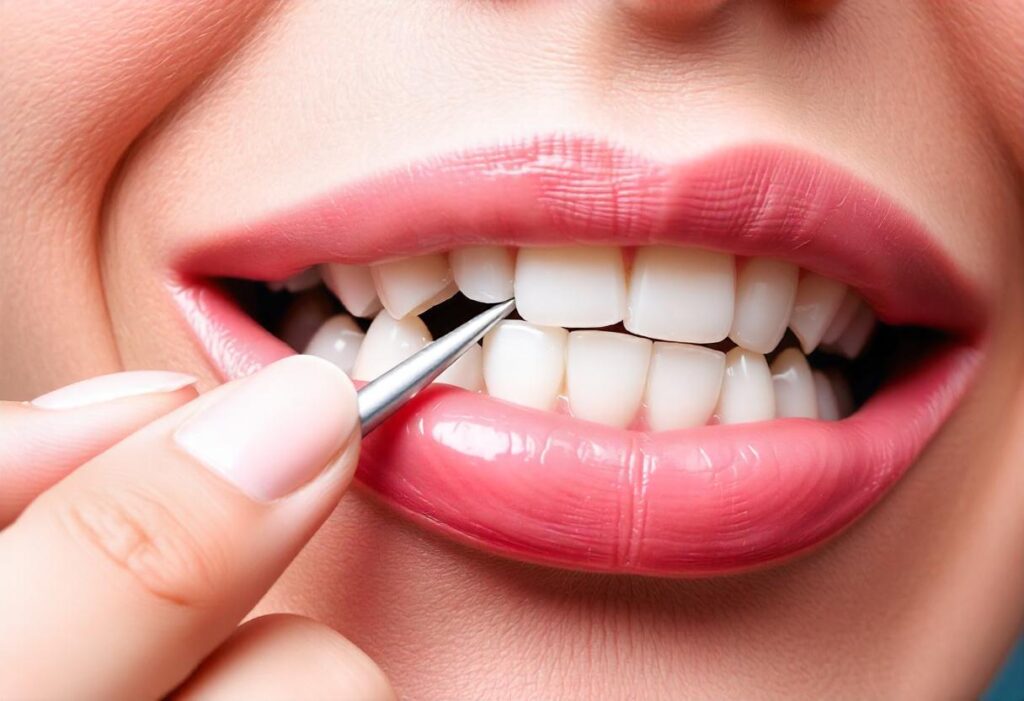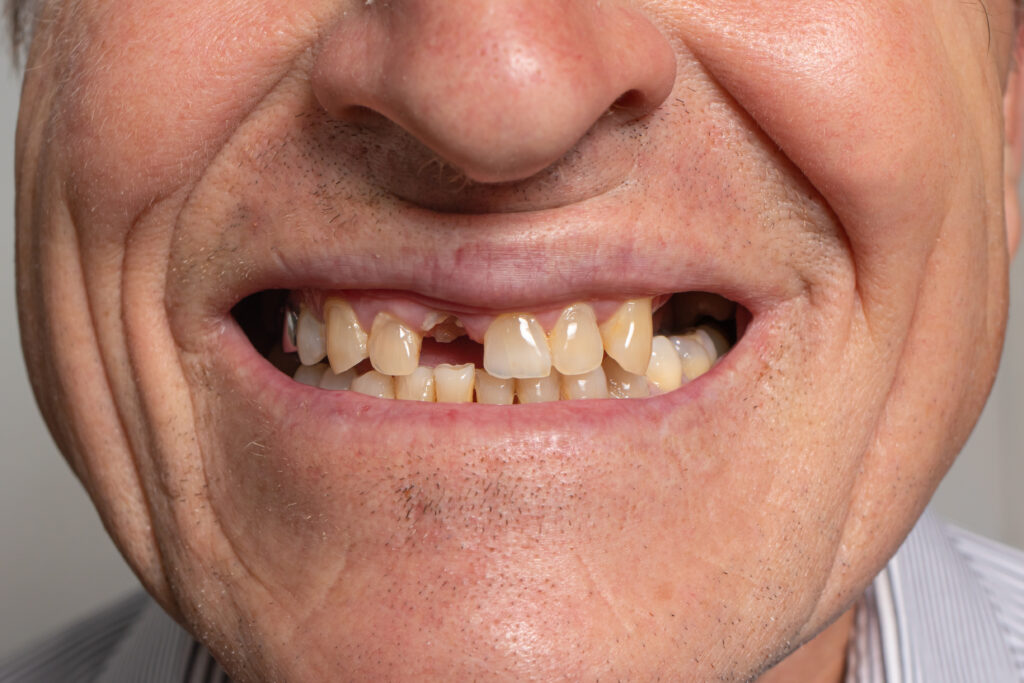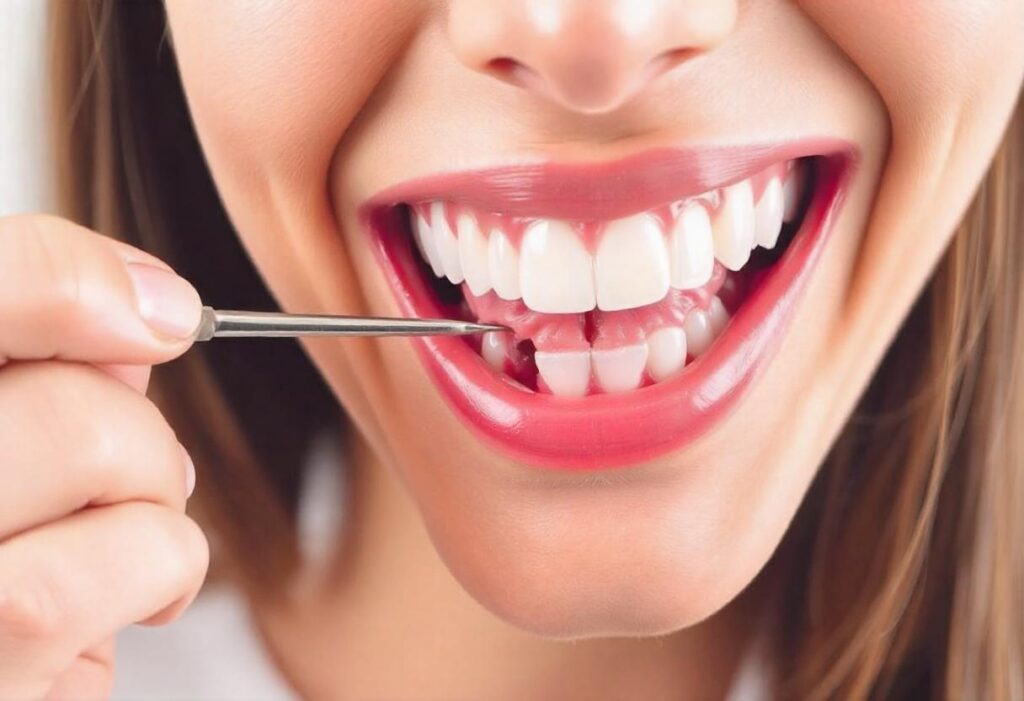A gap-toothed grin might be charming on a child, but for many adults, gaps in their teeth can be a source of self-consciousness. Whether it’s a noticeable space between your front teeth or gaps caused by missing teeth, these imperfections can affect your confidence and even your oral health. The fantastic news is that modern dentistry offers a wide array of solutions to fix those gaps and give you a smile you’ll be proud to show off! This guide will walk you through the causes, the concerns, and most importantly, the many ways you can achieve that picture-perfect smile.
What Causes Gaps to Appear Between Teeth?
That space between your front teeth is officially known as a diastema. While some people embrace it as a unique characteristic, others may feel it detracts from their smile. But what causes these gaps to appear in the first place? Often, it’s a combination of factors, and understanding these can help you determine the best approach to closing the gap.
One of the most common causes is genetics. If your parents or grandparents had gaps, you might be predisposed to them as well. This is often related to the size and shape of your teeth in relation to your jawbone. A large jaw combined with smaller teeth can result in spaces, especially between the front teeth.
Another frequent cause is missing teeth. When you lose a tooth, the surrounding teeth can drift out of position, creating gaps. This can happen over time, even if the initial tooth loss occurred years ago. This shifting can also be exacerbated by habits such as thumb sucking or prolonged pacifier use in childhood, which can put pressure on the front teeth and push them apart. Similarly, a tongue thrust, where you push your tongue against your front teeth while swallowing, can gradually create a gap.
Finally, gum disease can also play a role. Advanced gum disease can damage the bone and tissues that support your teeth, causing them to loosen and shift. This is why maintaining good oral hygiene is essential, not just for preventing gaps but for your overall oral health.
Should I Be Concerned About Gaps in My Teeth?
While some gaps are purely cosmetic issues, others can have a real impact on your oral health and overall well-being. It’s important to consider both the aesthetic and functional aspects when deciding whether to address a gap in your teeth.
From an aesthetic perspective, a straight, even smile can do wonders for your confidence. Many people feel self-conscious about gaps in their teeth, and closing these gaps can significantly improve their self-esteem and how they feel about their appearance.
But gaps can also affect your oral health. They can act as traps for food particles, making it harder to clean your teeth effectively and increasing your risk of cavities and gum disease. Properly cleaning between teeth is crucial for removing plaque and bacteria, and gaps can make this more challenging.
Furthermore, gaps can contribute to bite problems (malocclusion), which can lead to jaw pain, headaches, and difficulty chewing. When your teeth don’t fit together properly, it can put extra stress on your jaw joints and muscles. In some instances, gaps can even affect your ability to pronounce certain sounds clearly, leading to speech difficulties.
How to Fix a Gap Between Your Front Teeth (Without Braces!)
If the idea of traditional braces doesn’t appeal to you, take heart! There are some fantastic alternatives for closing that gap between your front teeth.
Dental bonding is a quick and relatively affordable procedure where a tooth-coloured resin is applied and sculpted to your teeth to close the gap. It’s a great option for smaller gaps and can often be completed in a single appointment. However, it may not be as durable or stain-resistant as other options and might need to be replaced or touched up over time.
Porcelain veneers offer a more durable and stain-resistant solution. These thin, custom-made shells are bonded to the front surface of your teeth, providing a flawless and natural-looking appearance. While more expensive than bonding, veneers can last for many years with proper care. They might require some minor enamel removal to ensure a proper fit, but this is usually a minimal amount.
Clear aligners (Invisalign) are another popular choice, especially for adults and teens who want a discreet treatment option. These removable, transparent aligners gradually move your teeth into the desired position. They offer the advantage of being nearly invisible and can be removed for eating and cleaning. However, they require discipline to wear consistently and are not suitable for all cases.
Closing Gaps Caused by Missing Teeth
Missing teeth can create significant gaps that affect both your appearance and your oral health. Fortunately, restorative dentistry provides effective solutions to address these gaps.
Dental implants are considered the gold standard for replacing missing teeth. These are titanium posts surgically placed in your jawbone to replace the roots of missing teeth. They provide a strong foundation for artificial teeth (crowns) and offer a long-term solution that functions and feels very much like natural teeth. While implants are more expensive than bridges, they are incredibly durable and can last a lifetime with proper care.
Dental bridges are another option for replacing missing teeth. They consist of artificial teeth anchored to your adjacent natural teeth. Bridges are less invasive than implants and more affordable, making them a good choice for many people. However, they may need to be replaced over time and can put some stress on the supporting teeth.
Closing Gaps with Braces: A Classic Approach
Braces are a time-tested method for closing gaps and correcting a wide range of orthodontic problems. They work by applying gentle pressure to your teeth over time, gradually moving them into the desired position.
Traditional metal braces are the most common type and are highly effective at closing gaps. They consist of metal brackets that are bonded to your teeth and connected by wires. While they are the most visible type of braces, they are also typically the most affordable.
Ceramic braces offer a more aesthetically pleasing option. The brackets are made of tooth-coloured or clear ceramic material, making them less noticeable than metal braces. They function in the same way as metal braces but are a popular choice for those who are concerned about the appearance of their braces.
Lingual braces are the most discreet option. They are placed on the back of your teeth, making them practically invisible. However, they can be more expensive and may take some getting used to, as they can initially affect your speech.
How Long Will It Take to Fix My Gap?
The treatment timeline for closing gaps in your teeth varies depending on the method you choose and the complexity of your case. Some treatments, like dental bonding, can be completed in a single appointment. Others, like braces or implants, can take months or even years to achieve the desired results.
- Dental Bonding: Often completed in a single appointment.
- Veneers: Typically takes two to three appointments.
- Clear Aligners: Average treatment time is 12 to 18 months.
- Braces: Treatment can take anywhere from 1 to 3 years.
- Dental Implants: The complete process, including healing time, can take several months.
- Dental Bridges: Usually requires two to three appointments.
What Will It Cost to Fix Gaps in My Teeth? (UK Pricing)
The cost of treatment in the UK will depend on several factors, including the chosen method, the complexity of your case, and the dentist’s fees. It’s important to get a personalised quote from your dentist to understand the exact cost of your treatment.
- Dental Bonding: £100 to £400 per tooth.
- Veneers: £400 to £1,200 per tooth.
- Clear Aligners: £1,500 to £5,000.
- Braces: £2,000 to £6,000.
- Dental Implants: £2,000 to £3,500 per implant (including crown).
- Dental Bridges: £500 to £1,500 per unit.
Many dental practices offer payment plans to help make treatment more affordable. Be sure to discuss your options with your dentist to find a plan that works for you.
Looking After Your New Smile
After you’ve invested time and money in fixing your gaps, it’s essential to take good care of your new smile. This will help ensure that your results last for many years to come.
Maintaining excellent oral hygiene is crucial. Brush at least twice a day with fluoride toothpaste, floss daily, and use mouthwash. If you have braces or aligners, diligently follow the care instructions provided by your orthodontist. This may include using special cleaning tools or avoiding certain foods.
Regular dental checkups are also essential. Visit your dentist for regular cleanings and checkups to maintain healthy teeth and gums. Your dentist can also monitor your treatment progress and identify any potential issues early on.
If you’ve had braces, wearing your retainer as instructed is crucial to prevent your teeth from shifting back. Retainers help maintain the position of your teeth after your braces are removed, ensuring that your beautiful new smile stays in place.
Be mindful of your diet, especially if you have veneers or bonding. These restorations can be damaged by hard, sticky, or crunchy foods. It’s also a good idea to avoid habits that can put stress on your teeth, such as chewing on pens or ice.
Why Choose Birchgrove Dental to Fix Your Gap?
Choosing the right dentist is a crucial step in your journey towards a confident smile. At Birchgrove Dental Practice, you’ll find a team of experienced professionals dedicated to providing high-quality care in a relaxed and welcoming environment. Here’s why they are an excellent choice for fixing gaps in your teeth:
- Experienced and Dedicated Team: Birchgrove Dental boasts a team of highly skilled dentists, hygienists, and nurses with extensive experience in various dental treatments, including cosmetic dentistry and orthodontics. They are passionate about helping patients achieve their smile goals.
- Comprehensive Range of Treatments: Whether you’re considering dental bonding, veneers, Invisalign, or traditional braces, Birchgrove Dental offers a wide range of options to suit your individual needs and preferences. They will work with you to determine the most suitable treatment plan for your specific case.
- Patient-Focused Approach: At Birchgrove Dental, patient comfort and satisfaction are paramount. They prioritise clear communication and take the time to listen to your concerns, answer your questions thoroughly, and ensure you feel at ease throughout your treatment journey.
- Focus on Cosmetic Dentistry: Birchgrove Dental has a strong focus on cosmetic dentistry, including treatments specifically designed to address gaps in teeth. They have a proven track record of success in helping patients achieve beautiful, natural-looking smiles.
- Convenient Location and Modern Facilities: Located in Cardiff, Birchgrove Dental Practice is easily accessible. Their modern facilities are equipped with the latest technology to ensure you receive the best possible care.
- Excellent Patient Reviews: Birchgrove Dental has received numerous positive reviews from satisfied patients, highlighting their professionalism, expertise, and friendly approach. You can read these testimonials on their website and other online platforms to see what other patients have to say about their experiences.
To learn more about how Birchgrove Dental can help you fix gaps in your teeth and achieve the smile you’ve always wanted, schedule a consultation today. Their friendly team will be happy to discuss your concerns, answer your questions, and create a personalised treatment plan that meets your needs and exceeds your expectations.
References
https://www.healthline.com/health/tongue-thrust
https://www.healthline.com/health/pacifier-teeth
https://www.nhs.uk/conditions/gum-disease/
https://pampers.co.uk/toddler/development/article/baby-thumb-sucking







